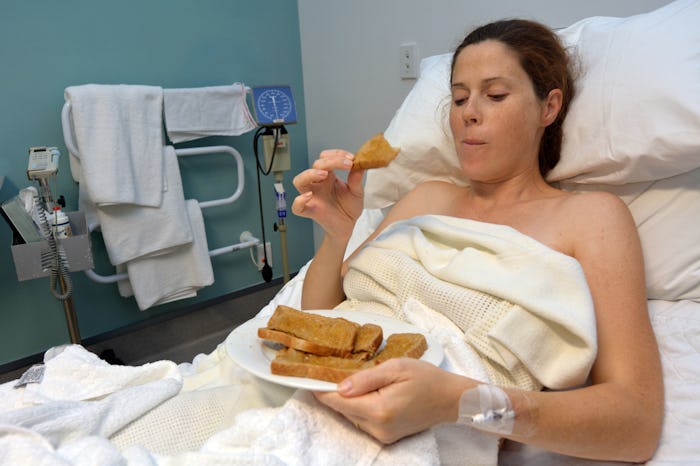Life

If You're Packing Snacks To Munch On During Labor, Here's What Experts Suggest
You might have heard that it isn't good to eat much while in labor, and the advice probably seemed contradictory. After all, how are you supposed to do the hardest work of your life on an empty stomach? As it turns out, the "no eating, no drinking" rule is slowly being regarded as archaic, and the latest studies suggest that snacking during labor is beneficial for most women (which seems like the biggest duh ever). But, what kind of snacks are good for labor?
Labor can be a very long process, and is a lot of work, as the University of Texas Southwestern Medical Center noted. It seems obvious that you should be able to replace the calories and energy you're losing over the course of your labor. In the past, though, women were told to fast during labor because of the heightened risk of aspiration during general anesthesia. But, because of advanced technology and medical knowledge, and the use of more regional anesthesia (like epidurals and spinal blocks), this is no longer a risk a majority of pregnant women face.
While the recommendation to not eat or drink during labor is changing, this certainly doesn't mean that downing a cheeseburger while laboring is a great idea. According to the website for Dr. Sears, fatty and greasy foods, as well as gassy foods, should be avoided. There's already enough going on inside your body — you hardly want to create more work for your abdominal organs, and nausea and vomiting is common during labor.
Katie Griffin, Registered Nurse and certified childbirth instructor, explains to Romper, "A good rule of thumb I extend to my patients is: Don’t eat it in early labor if you don’t want to see it later in labor!" Instead, notes Griffin, think about the type of foods you might eat before setting out to run a marathon.
Certified Labor & Delivery Nurse Grace Godwin agrees. "Labor can be similar to a long run," she tells Romper. "The uterus is a muscle that needs fuel to work effectively. Think of small snacks that are caloric-dense, such as almonds or a banana. These will fuel your body without overloading your stomach."
In early labor, eating complex carbohydrates (like grains and pasta) will help your body store energy and release it slowly through the hours of labor that follow. Eating simple carbs (like fruits) later in labor will give you a quick burst of energy without leaving you full enough to feel nauseous.
If you’re looking for a meal, consider pasta, waffles, or a light soup, says Griffin. "Fruit, toast, smoothies, and popsicles are all great options for a quick snack in between contractions," she says.
Patti, 35, mom to a 1-year-old girl in North Carolina, tells Romper that she snacked on Annie's crackers during her labor. "Eating a few graham or cheddar bunnies was an easy to way to manage hunger and nausea during my long labor," she says. "I think I wasn't supposed to eat anything, but my nurses looked the other way. It was over 20 hours; I had to eat something."
Fit Pregnancy also suggested that light, clear foods and drinks are a good option. Jello, broth, light soups, and (mom-favorite) popsicles are all low-fat and low-risk foods you can eat during labor.
Godwin confirms. "Truly, staying hydrated with a drink containing calories (think coconut water or an electrolyte drink) is often enough."
"Broths were my favorite during labor," says mom of two, Nikki, to Romper. "They were light, tasty, and surprisingly filling without being gag-worthy through those hard contractions. I can't imagine laboring when starving."
Katie, 37, mother of three in Connecticut, munched on popsicles during her labor, the only thing her nurses would allow. "The coolness was soothing," she tells Romper, "but, I was laboring for 23 hours. I could've used a burger."
Hospitals are slower to revise their procedures than birthing centers, but they are coming around. As The New York Times noted, it is still risky for many women, particularly those prone to emergency or repeat C-sections, to eat during labor.
Dr. Lakeisha Richardson, OB-GYN, agrees. She tells Romper, "Labor is very unpredictable. Patients can go from an uncomplicated labor to a placental abruption in a matter of seconds. If a patient has to be intubated due to obstetrical emergencies, they are at a very high risk for aspiration and chemical pneumonia." It is very important that women know how risky it can be to eat while laboring, especially with high-risk cases, Richardson notes.
As of now, eating during labor is largely case-by-case, and depends on your hospital's labor rules, your doctor's recommendations, and your own pregnancy and condition. Talking to your doctor will give you an idea of their specific labor practices, and what will be best for your upcoming labor and delivery. At the very least, you can plan your first post-delivery meal with your partner and have something to look forward to. (You know, besides the baby.)
Check out Romper's new video series, Romper's Doula Diaries: